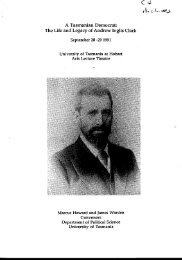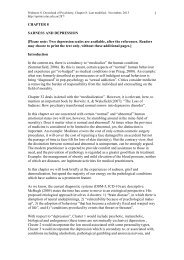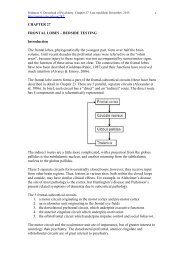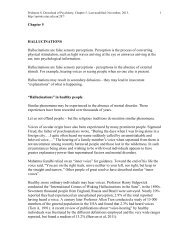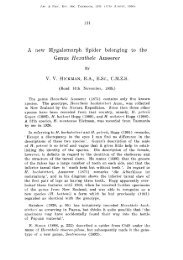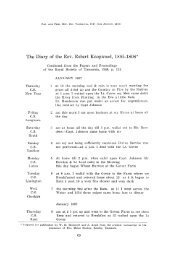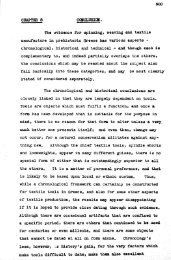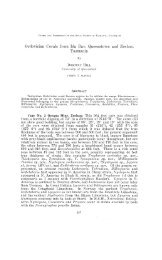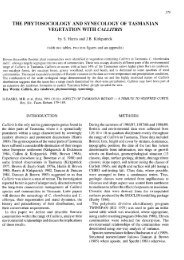PDF (Chapter 4: Delusions and Delusional Disorder) - UTas ePrints
PDF (Chapter 4: Delusions and Delusional Disorder) - UTas ePrints
PDF (Chapter 4: Delusions and Delusional Disorder) - UTas ePrints
You also want an ePaper? Increase the reach of your titles
YUMPU automatically turns print PDFs into web optimized ePapers that Google loves.
Pridmore S. Download of Psychiatry, <strong>Chapter</strong> 4. Last modified: November, 2013<br />
http://eprints.utas.edu.au/287/<br />
14<br />
John had a delusional system. He believed that multinational companies believed that he<br />
was a threat to their prosperity, as his actions may force them to pay higher taxes.<br />
Supporting this central delusion were other delusions including that the multinationals<br />
were having people give him messages in the train by holding up the financial pages of<br />
the newspaper <strong>and</strong> having him watched in a variety of ways, including via fibre optic<br />
devices hidden in the power points. He also had the delusion that the multinationals had<br />
dug tunnels under his place of work. These are persecutory delusions. Such delusions<br />
often have a gr<strong>and</strong>iose flavour – in this case a clerk, with relatively little influence,<br />
believed that powerful multinational companies were concerned that he could hurt them.<br />
He believed he was so important that they employed dozens of people to watch him <strong>and</strong><br />
even went to the enormous expense of digging tunnels under the building where he<br />
worked.<br />
This case illustrates the interesting point that people with complex delusional systems<br />
can, sometimes for years, function reasonably effectively in the community. This is<br />
possible when the delusional system is the only psychotic symptom <strong>and</strong> the delusions are<br />
limited to certain areas of life. In the case of John Miller, symptoms were most<br />
distressing when he was travelling to <strong>and</strong> from, <strong>and</strong> when he was at work. It is possible<br />
for a person with a delusional system to work through to retirement without serious work<br />
problems, particularly when the delusions do not involve the workplace. Usually, fellow<br />
workers find such people to be tense, secretive <strong>and</strong> isolative, but also, precise (because<br />
they are cautious to protect themselves) <strong>and</strong> determined. Generally, the better the<br />
individual is able to function, the slower they come to the attention others <strong>and</strong> the later<br />
they receive offers of help.<br />
It may be very difficult to obtain a clear underst<strong>and</strong>ing of the beliefs of people with<br />
persecutory delusions <strong>and</strong> to commence treatment. The nature of the condition means all<br />
attempts to discuss matters with them are interpreted as a threat or as “evidence” of a<br />
conspiracy. Believing they are being persecuted rather than sick, they “sensibly” reject<br />
the initial, <strong>and</strong> sometimes all, offers of treatment.<br />
Helen had noticed her husb<strong>and</strong> had changed. He laughed less <strong>and</strong> was often angry about<br />
the events of the day at the office. She saw this as a reaction to the additional<br />
responsibilities of fatherhood. She married John “for richer or for poorer”, <strong>and</strong> ever since<br />
they met, had known he chose to avoided stressful situations. She was glad he still had<br />
the Surf Club <strong>and</strong> the local football team to take his mind off his stress.<br />
Helen knew nothing of John’s delusional system until after he went onto sick leave.<br />
Spending more time at home <strong>and</strong> more than usually worried, he started to talk to her<br />
about being watched at work. She thought this was a terrible way to treat an employee,<br />
<strong>and</strong> that she should go <strong>and</strong> complain to the Federal Minister for Taxation. Eventually she<br />
had contact with the family doctor, the union officials <strong>and</strong> the psychiatrist, <strong>and</strong> came to<br />
know the full story. She continued to support her husb<strong>and</strong> <strong>and</strong> protested that,<br />
“He wouldn’t be like this if they didn’t keep cutting the public service work force <strong>and</strong><br />
putting more <strong>and</strong> more stress on the few who’re left”.






